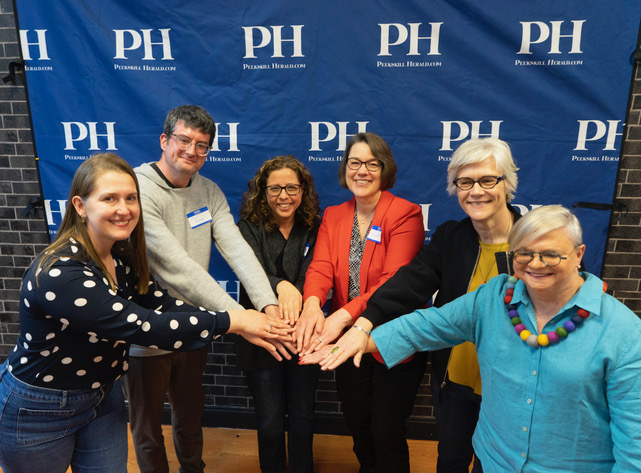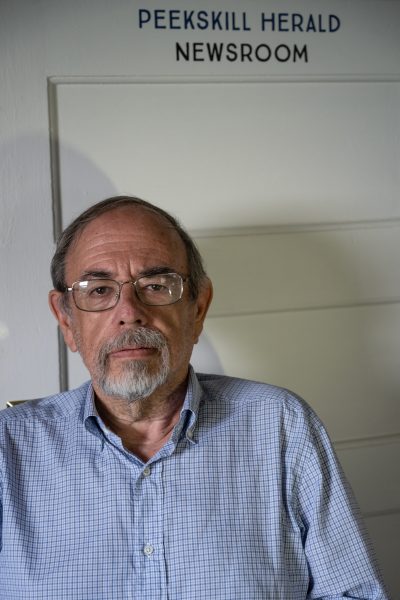For two hours on a sunny Saturday afternoon more than 60 members of the Peekskill community came together to share ideas about an important topic that impacts everyone.
Participants silenced their Facebook, Instagram and phone notifications for a while and talked with old friends in person and met new folks. They spoke and listened and stepped out of the “virtual” world to learn what other people thought.
The occasion was “A Conversation on Housing in Peekskill” hosted by the Peekskill Herald on March 30 at the Red Door Creative Space next to the Paramount Theater. “The idea for the panel came about after viewing a short documentary film created for the Herald,” said Publisher Regina Clarkin.
The discussion kicked off with a viewing of the six-minute documentary “Peekskill: A Friendly Town” on housing and gentrification in Peekskill, created by three documentary students at Marist College in Poughkeepsie.
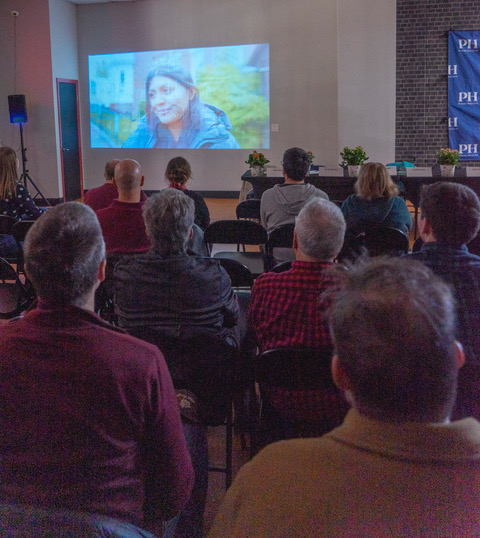
Christina Georgiou, Laratee VanNieuwenhuyze, and Anaiya Bobo spent time in Peekskill last September and October encountering people on the street and asking them questions about the housing situation and why they were living here.
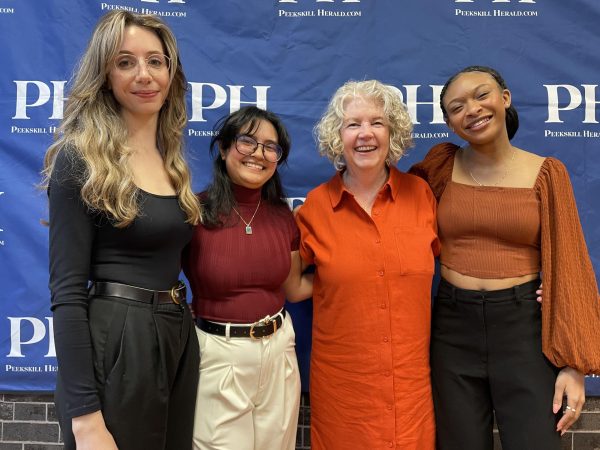
A panel of Peekskill residents all involved in the world of housing discussed the issues we face in trying to provide homes for those who live here and for others who want to. The conversation was moderated by Rabbi Jennifer Jaech of Temple Israel in Croton who has lived in Peekskill for 21 years.
Through the talk and questions from the audience, it became clear that the goal of “affordability” was the challenge and that the community as a whole has the opportunity to help shape what that will look like here in Peekskill.
Defining just what affordability means
Panel member Alexis Perrotta, a Peekskill resident and professor at CUNY Baruch, posed the issue as one of “income targeted” housing, pointing out that affordability is in the wallet of the beholder.
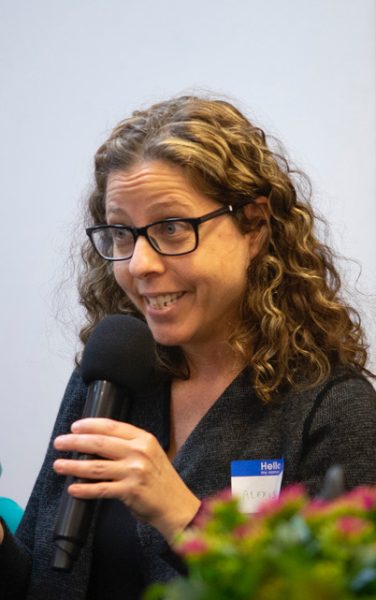
“We have to think about the full range of income needs for households. They can range from the un-housed to limited- and fixed-incomes, public housing, two-earner middle-income households, or two professionals, firefighters, and also market rate for people with the most choices where they live,” said Peekskill Planning Director Carol Samol.
“A planner has to think of the whole health of the entire city,” said Samol who began her work in Peekskill in December.
The right balance of housing to match the different needs of the scale of incomes will provide opportunities for the lower income households, for those earning more, and also for the wealthiest residents. How that happens becomes a combination of market forces and government decisions.
“Places that are gentrifying are becoming more attractive to current residents, and people are more likely to stay in the places that are gentrifying,” Perrotta said, noting that it’s a perspective that is counterintuitive but is a consistent finding after more than 20 years of research.
Increasing the supply of housing at the upper end might drop prices there, but it doesn’t reach across all segments. “Just building more luxury housing doesn’t do anything to the price at the lowest end,” said panelist Alex Hanson.
Hanson, who owns a community development company that builds housing for profit and non-profit models, opened her remarks by speaking about the structural issues in the affordable housing industry.
“We have structured a housing market that is designed to do two mutually exclusive things, we create wealth through home ownership and rental income and the second is to provide shelter. We have created a system where those two things are in conflict. The system incentives the creation of wealth through home ownership by keeping property values high and limiting supply and limiting who has access to that supply,” said Hanson.
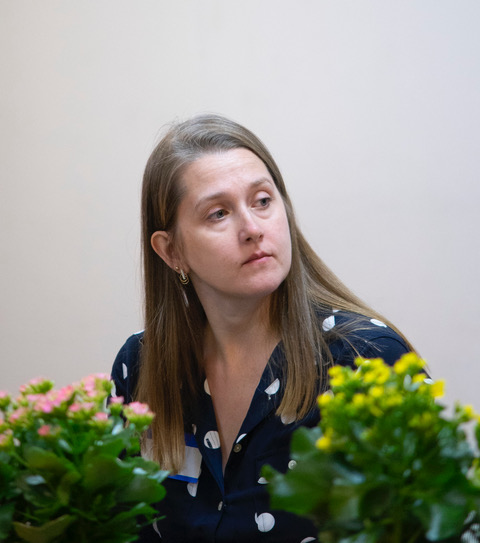
“Everybody recognizes that our current housing system is failing. It’s failing across the board. We’ve created a system where the right to shelter is in conflict with the wealth creation through home ownership. And the other thing that underpins that is, we as a society, have failed to create a robust social safety net. That awareness is missing in the conversations about housing and affordable and it’s the undercurrent of the conflict,” said Hanson.
Peekskill is in growth mode now
“We are not going to build our way out of the housing crisis,” she city Planning Director Carol Samol who noted that the city is not in this alone. “County and state government have roles in this as well.” She talked about the preservation of existing housing including improvements and maintenance.
In Peekskill, growth in the housing stock is happening now. According to Samol, Peekskill is the third-fastest growing municipality in Westchester and the city is at its highest population figure ever.
The new affordable housing building at 645 Main St. brought 82 units onto the market last year. The soon-to-open Park Place Tower will provide 181 apartments at market rate.
Other projects in front of city planning and zoning commissions seeking approvals include 46 units of “Mountain View Estates” off Lockwood Road near the Hat Factory, 28 residential units off of Frost Lane and Pataki Farm Drive, 125 apartments at 201 N. Division St. (the former RAL building), 57 one and two-bedroom residential units at Broad and Howard streets.
If all of them are built that would bring another 25 units of targeted income housing to the city given the requirement to make 10 percent of new units affordable.
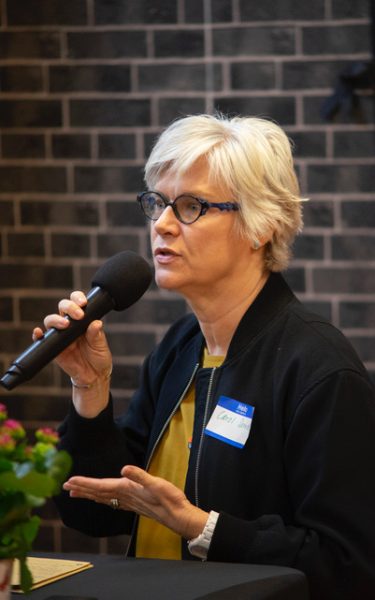
Already approved are 51 market rate condominiums under construction at 505 South Street at Grove. Additionally, two buildings in the downtown have received approvals; 823 South Street for 13 apartments and 1102 Main Street for 20 apartments.
And lingering on the riverfront is a potential 186 units if developer Martin Ginsburg returns with a plan to build on his riverfront parcels at the train station that could win Common Council approval.
Deciding what kind of growth is right for Peekskill
Market forces and rules of supply and demand, along with targeted government subsidy programs, determine the price of housing. The housing market is tight all throughout the New York metro region and Peekskill is part of that supply-constrained market. So home prices have skyrocketed here and for sale signs are still scarce.
One way to provide additional housing is to restore the existing homes that need repairs, perhaps with some sort of government underwriting through loans and grants.
Cynthia Knox, executive director for Caring for the Hungry and Homeless of Peekskill, opened her remarks by saying housing is a basic human right and pointed to the need for active citizen involvement.
“We must advocate for government investment in public housing and housing vouchers and tax credits for developing affordable housing,” Knox said. “Show your support for public housing and affordable housing and shelter for the un-housed when they are proposed.”
Given there is a limited amount of land left to develop, panelist Conor Greene, co-founder of the citizen advocacy group Peekskill Walks, pointed to ways to maximize the space available.
“If a developer wants to build four or five stories with 10 percent affordable, why not provide a reasonable height or density bonus to allow up to eight stories if appropriate for the location,” he said. “This would provide more affordable units. Make the trade-off a little more height, a little more density for more below-market housing I think that’s a very good deal.”
Hanson pointed out that New York state looks favorably on projects that have support and approvals at the local level.
“Developers go where they are wanted,” she said. “Decide what kind of community you want through a master plan and then make Peekskill a pro-development community.”
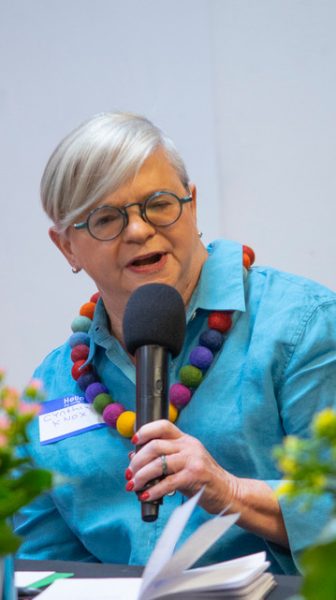
One key to mapping out the future of housing development in Peekskill is finally creating the long-delayed comprehensive plan that would determine what can be built and where.
“The challenge of creating a comprehensive plan helped draw me to Peekskill,” Samol said. “I think this is the right moment in Peekskill to do this.
“I can assure you we will have a robust conversation and engagement with all the different members of the community and housing will most certainly be a very significant part of it.”
In closing remarks, Knox said she believe the conversation was a catalyst. “There is a lot of change going on. We’re going through a transformation and it’s encouraging to see the community come together and be intentional about who we want to be as a community.
“I’m leaving here feeling optimistic,” said Greene. “We get bogged down in challenges, but there is an opportunity here to use our ability to collectively solve these challenges. We’re in a great position to do this process as a community together. We can address the housing affordability issue without mass displacement without losing what makes Peekskill great.
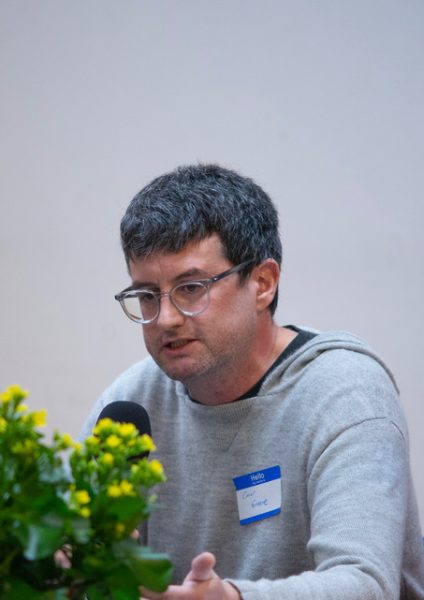
What makes me hopeful is I believe this is a moment that is calling for a collective reimaging on housing, a community-based vision on housing,” said Hanson.
“We have so much agency to envision a new way of doing this. We have real intentional vision that has a lot of moral clarity specifically around this issue of housing as a human right, which is what we really need.” “I feel a spirit here in Peekskill that is reflected in the fact that we have this range of housing, from a shelter, to public housing, large Victorians, to multi-family homes to market rate housing. There’s so much will in this community to continue to build on that legacy. And that makes me very hopeful.I believe this is a catalyst for a larger conversation,” said Hanson.
“I’ve come to believe that the only way we are going to solve this is collectively and communally, not individualistically with the one hero, but very much being in community. Peekskill is such an exceptional special, community and people really care about this,” Hanson said.
As the panel discussion ended after two hours, Clarkin introduced the concept of ‘Living Room Dialogues’ to keep the conversation going. She referenced similar dialogues that took place in Peekskill during the 1960’s as the vehicle for people to discuss important issues affecting the community in the intimate setting of living rooms.
The goal of these Living Room Dialogues will be to invite various Peekskill residents into each other’s homes to continue talking about housing and its aspect. She invited participants to indicate if they want to join. She introduced two of four families who were present and will welcome others into their homes. For more information, reach out to her at [email protected]



